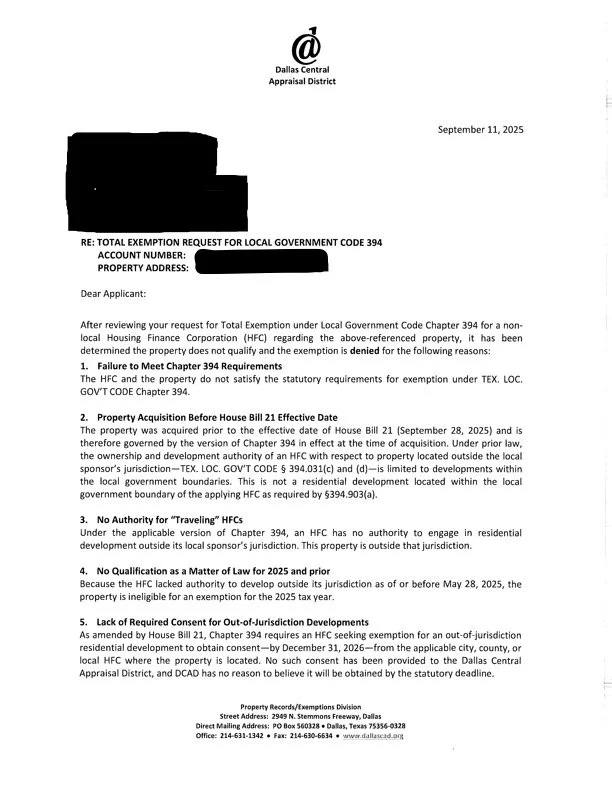
Press Releases
HOUSINGWIRE: The Texas law threatening to break the affordable housing equation
Texas’ new HB 21 law threatens to upend affordable housing partnerships, destabilize existing projects, and shake investor confidence across the state.
October 22, 2025, 4:32am by Kevin Gillen | Article originally published on HousingWire.com
A quiet change in Texas law this past spring could ignite a crisis in affordable housing – and send a chilling signal to investors nationwide.
House Bill 21 (HB 21), passed in May, drastically rewrites the rules for how affordable housing partnerships in Texas qualify for property tax abatements. For years, those abatements have been one of the few effective tools local governments had to make below-market housing financially feasible amid Texas’ severe housing shortage.
These exemptions were not giveaways. Developers agreed to build and maintain affordable units; in return, they got predictable tax incentives that made the math work.
HB 21 blows up that understanding.
The new law imposes new, more stringent affordability mandates, annual audits, and – most significantly – forces every project to secure the blessing of local politicians. Even more troubling, the law applies retroactively to agreements made years ago. Some counties have already used it to revoke exemptions that developers and investors relied upon for existing developments. Dallas County is doing just that, leaving property owners and working-class renters stuck in limbo.
This isn’t just a bureaucratic headache. Retroactive policy changes undermine the bedrock principle of stable expectations. Housing is capital-intensive. Projects require financing that’s predicated on clear, durable rules. When those rules shift after the fact, capital dries up, projects stall, and housing supply shrinks.
That’s exactly what’s now at risk. The Texas Workforce Housing Coalition recently filed suit against the Bexar Appraisal District, arguing that HB 21’s retroactivity violates basic constitutional protections and amounts to a “war on Texas’ affordable-housing developers.”
But make no mistake – this isn’t just about developers. It’s about tenants, too.
At San Antonio’s Willowbend Apartments – one of the properties caught up in the dispute – families who moved in under long-term affordability commitments may now face steep rent hikes or even displacement if the project suddenly becomes taxable. That means fewer affordable units, higher costs, and more instability for vulnerable households.
Supporters of HB 21 claim it reins in “traveling” development entities, which set up in one jurisdiction but grant tax breaks in another. But HB 21’s cure is worse than the disease.
By requiring 50% of units in new projects to be affordable – far beyond the threshold of financial viability – the law is likely to stop more housing from being built than it creates. And it doesn’t just punish developers, but also the low-income tenants now living in these properties.
Texas has long prided itself on being a stable, pro-growth environment – a state that welcomes investment with clear, consistent rules. That reputation has fueled the state’s population boom and economic success. But HB 21 undermines that progress, replacing predictability with uncertainty and threatening the very housing supply Texas so desperately needs.
If the Legislature wants more accountability in this system, there are better tools: prospective-only changes, stricter reporting requirements, and targeted oversight could address abuses without destabilizing existing contracts. Many in the industry would actually welcome that clarity. But HB 21, as written, isn’t reform. It’s a rupture.
The law tells investors that Texas’s word is no longer its bond. And once that trust is broken, both markets and tenants pay the price.
Kevin C. Gillen is a senior research fellow at the Lindy Institute for Urban Innovation and an adjunct professor of finance at Drexel University.
TWHC Files Multiple Texas PIA Requests
AUSTIN, TX — The Texas Workforce Housing Coalition (TWHC), which represents affordable-housing stakeholders across the state, has filed multiple requests under the Texas Public Information Act to uncover communications between county appraisal districts and outside individuals and organizations regarding the implementation of House Bill 21 (HB21).
The move comes as certain appraisal districts appear to be weaponizing HB21—the recently-passed housing reforms—against cross-jurisdictional Housing Finance Corporations (HFCs) prior to HB21's scheduled restrictions taking effect. The appraisal districts' actions target HFCs and developers who created affordable housing under previously approved structures and tax exemptions, putting thousands of working-class families at risk.
If these efforts succeed, the consequences will be devastating: foreclosures of affordable-housing properties, mass evictions, and working Texans—primarily teachers, nurses, first responders, and working parents—being forced out of their homes.
“The history here makes clear that the positions now being taken by certain appraisal districts are politically motivated and not based on a fair reading of the law. While we look forward to presenting our legal positions in the appropriate forums, we’re also concerned about the role of certain politicians and their network of insiders and enablers who may stand to benefit from the actions of the appraisal districts,” said Trey Cox, Partner at Gibson Dunn & Crutcher LLP and counsel to TWHC. “Like all Texans, we believe government agencies must stay above politics. This is step one in keeping everyone accountable.”
Last month, TWHC also filed a lawsuit challenging the constitutionality of HB21. The suit argues that HB21 unlawfully retroactively imposes new rules on affordable-housing deals that were legally closed years ago, impairing billions of dollars’ worth of contracts. Such retroactive rule-changing would send a chilling message to anyone considering investing in Texas: that the rules of the game can be rewritten at any time, after the fact.
About the Texas Workforce Housing Coalition
The Texas Workforce Housing Coalition (TWHC) is a statewide alliance of affordable housing providers committed to one mission: creating and preserving affordable homes for Texas families. TWHC works with industry peers, policy advocates, and trusted partners to ensure hardworking Texans have a safe, stable place to live.
Dallas Appraisal District’s Misguided Attack Puts Texas Families and Communities at Risk
Last week, the Dallas Central Appraisal District (DCAD) launched an unprecedented attack on a affordable housing, sending more than one hundred notices to projects owned by Housing Finance Corporations (HFCs) that operate across jurisdictional lines. DCAD now claims—contrary to decades of practice—that these HFCs were never permitted to own property outside their home counties, even before the Legislature passed HB21 earlier this year.
The facts tell a different story. For years, DCAD and appraisal districts across Texas issued written predetermination letters confirming both the legality of these ownership structures and their tax-exempt status. Developers relied on those approvals to build thousands of a affordable homes for working Texans.
Now, DCAD is attempting to rewrite history. Its sudden reversal is not only legally groundless—it is dangerous. By weaponizing HB21 against the very developers who stepped up when others would not, DCAD threatens to destabilize the entire a affordable housing sector. The fallout will be swift and severe:
Higher rents for teachers, nurses, first responders, and working parents.
Forced displacement as a affordable communities are forced into market-rate conversions.
Community disruption as children are uprooted from schools and families are pushed farther from jobs and support networks.
Appraisal districts are meant to be nonpartisan, fact-driven arms of government—not political actors. Texans know that a deal’s a deal. State and local governments invited investment, approved contracts, and gave their word. Developers delivered. Now DCAD is moving the goalposts in a way that threatens both hardworking families and Texas’s reputation as a pro-business, pro-growth state.
It’s time for DCAD to reverse course, process the lawful exemptions to which HFCs are entitled, and honor the commitments that put roofs over thousands of Texas families’ heads—by enforcing the law as written.
Affordable-Housing Coalition Files Lawsuit Over Unconstitutional Housing Reform
It all begins with an idea.
The Texas Workforce Housing Coalition is suing the Bexar Appraisal District, alleging violations of the Texas Constitution in the implementation of HB21 housing reforms
Lawsuit says unconstitutional attempts to revoke properties’ tax-exempt status will exacerbate State’s affordable-housing crisis and spark mass evictions of middle- and working-class families
AUSTIN, TX – 09/09/2025 – The Texas Workforce Housing Coalition (“TWHC”), a group representing affordable-housing stakeholders, and Post WB Apartments, LLC, today filed suit against the Bexar Appraisal District, challenging the constitutionality of House Bill 21 (“HB21”). The lawsuit says the implementation of the reforms sparked by HB21’s passage earlier this year will exacerbate the affordable housing crisis in Texas and spark mass evictions of middle- and working-class families, including teachers, nurses, and first responders.
For decades, Texas law (Texas Local Government Code § 394, or “Old Chapter 394”) offered real estate developers a straightforward deal: partner with a publicly-sponsored Housing Finance Corporation (HFC), rent to low- or moderate-income Texans, and receive a 100% property tax exemption. Developers relied on Old Chapter 394 to invest billions of dollars in Texas on long-term projects that provide affordable housing for families, including teachers, nurses, first responders, and other essential workers – allowing them to live in the same communities where they work.
But HB21, passed in May 2025, changed the laws governing these deals and applied them retroactively, impairing the contracts that were signed under Old Chapter 394, all in violation of the Texas Constitution. And even though HB21 does not go into effect for existing affordable-housing developments until Jan. 1, 2027, appraisal districts, including the Defendant, have begun weaponizing HB21 by reversing their own prior approvals of deals they now say were never legal to begin with, even under Old Chapter 394.
“The State of Texas lured billions of dollars worth of investments from real estate developers to build affordable housing for working class Texans with the promise of favorable tax treatment only to now pull the rug out from under those developers,” says Gibson Dunn & Crutcher Partner Trey Cox, lead attorney in the case. “The unconstitutional implementation of HB21 is nothing less than the breakdown of the rule of law in Texas. Worse yet, the teachers, nurses, first responders, and other essential workers who currently benefit from affordable housing will be the ones hurt most as they will likely be forced to move from their homes when affordable housing units across the State begin to evaporate.”
Plaintiffs will seek a declaration from the Court that HB21 violates the Texas Constitution and that Old Chapter 394 allowed HFCs to own property outside of their home jurisdictions in these prior deals.
Put simply, in addition to the constitutional violations, Plaintiffs argue that if the laws of the State of Texas can be changed at any time and applied retroactively to already closed deals, destroying the contracts and the economics of those deals, it will have a catastrophic chilling effect on investment in the State, as no developer, lender, or investor can reasonably justify investing in Texas in the future.
Last week, TWHC also filed a petition to intervene in Williamson County’s lawsuit against the Cameron County Housing Finance Corp. (“CCHFC”). That lawsuit seeks a judgment that the CCHFC lacked legal authority to “acquir[e] property outside of Cameron County” or “obtain tax exemptions for property outside of Cameron County.” Because some of TWHC’s members partnered with the CCHFC to acquire, lease, and operate properties in Williamson County, such a judgment would harm those members’ contractual rights under Old Chapter 394.
TWHC is represented by Gibson, Dunn & Crutcher LLP and Chasnoff | Stribling LLP.
About The Texas Workforce Housing Coalition
TWHC is a coalition of Texas affordable housing providers who are united by the same mission: creating and preserving affordable housing across Texas. We partner with industry peers, policy advocates and best-in-class partners to fulfill our mission.
About Post WB Apartments, LLC
Post WB Apartments, LLC is a Texas limited liability company doing business in Bexar County at 8330 Potranco Road, San Antonio, TX 78251, at the apartment complex commonly known as “Willowbend Apartments.” Post WB Apartments, LLC is a joint venture between entities created by the Cameron County Housing Finance Corporation, Post Willow Bend MM, LLC, and Commonwealth Texas, Ltd.


